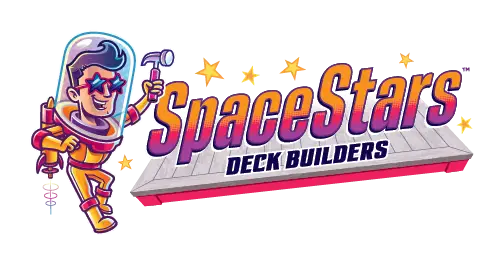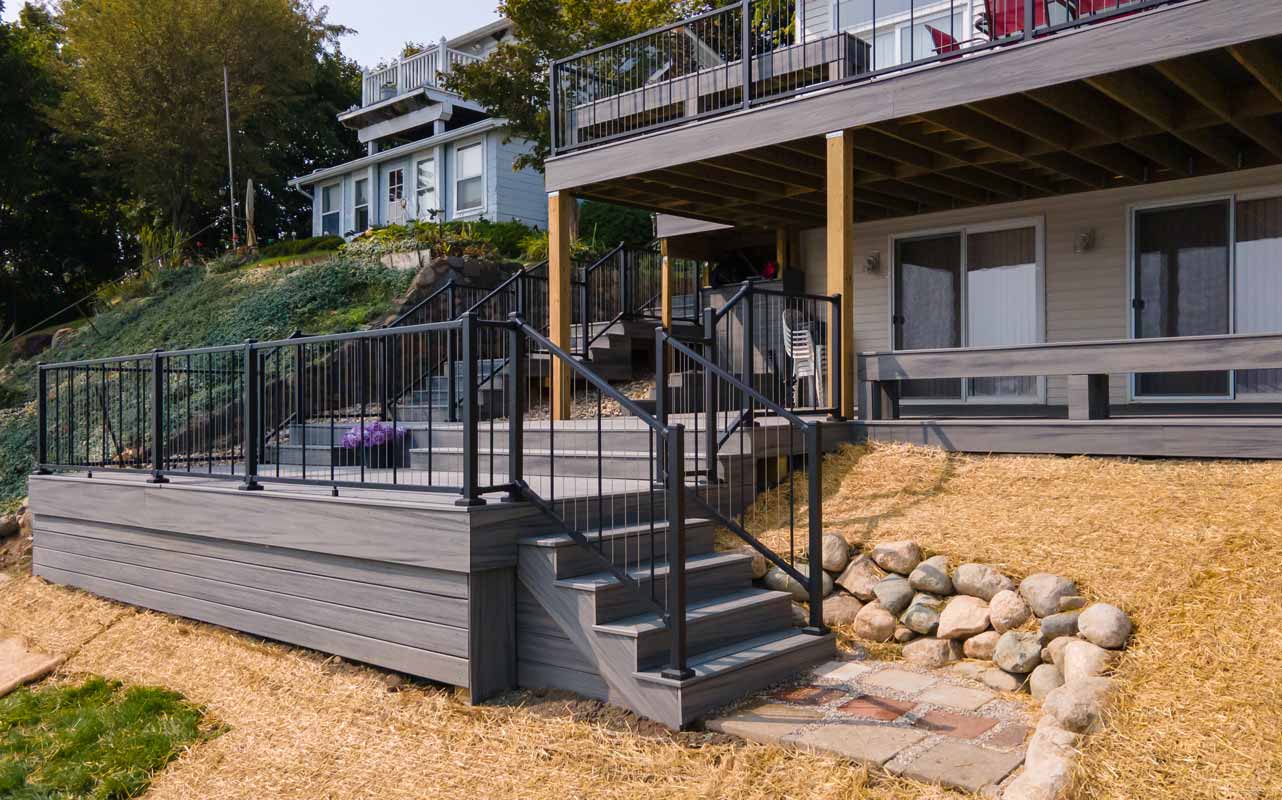Table of Contents
ToggleEverything You Need To Know About Trex Decking
Listen – they don’t call us SpaceStars for nothing. From the first plans to the final touches of your project, our priority is to create a seamless experience that leaves you feeling excited about your new outdoor living space. How do we achieve this? Well, we boast stellar service, excellent contractors, and the highest quality materials. That’s why we love working with Trex Composite Decking materials to give our clients a deck that’ll outlast rain, heat, and anything else Michigan throws at you – which is a lot. This blog provides a complete guide to Trex Decking and answers all your questions, ensuring you feel confident in choosing the right material for your next project.
What is Trex Decking?
Trex is a recycled composite that comes in a variety of colors, grains, and performance capabilities to fit your home’s aesthetic and technical needs. Composite combines recycled wood and plastic to create a durable, low-maintenance, and pest-resistant material, making it an excellent alternative to traditional wood.
One of the coolest things about Trex Decking is that it’s made from 95% recycled materials. Our team cares about reducing environmental impact while providing a stylish and functional outdoor living solution, which makes Trex a clear and excellent choice for our projects.
Composite or wood
Both wood and composite offer unique benefits and drawbacks, and careful consideration is important for any project. To learn more about wood decking and our offerings, you can check out our wood decking guide here or look at our gallery here.
| Composite | Wood |
| Lower maintenance | Requires staining, painting, and sealing |
| Pest resistant | Susceptible to pest infection |
| Higher cost | Lower cost |
| Emulates wood but is not identical | Natural wood look and feel |
| Stands up to the elements | More susceptible to weather damage |
Both natural wood and composite decking are visually appealing options that can offer beautiful and long lasting results, but composites like Trex take the cake in terms of maintenance, longevity, and reliability.
Why we use Trex Decking
1. Eco-friendly
Environmental impact is one of the top considerations we make during any project. If you’re going to enjoy the great outdoors might as well support it as well! Made using 95% recycled material, Trex uses a mix of reclaimed wood and recycled plastic film to create a composite that removes harmful materials from the environment and reduces the frequency that your deck needs to be repaired and replaced.
Trex also uses reclaimed sawdust as part of their blend. Trex has a commitment to consumers that trees are never cut down to make their composite decking. Sawdust is the unavoidable byproduct of any wood project, so finding new uses for it is a great way to reduce environmental impact.
For the plastic component, Trex uses recycled plastic film from sources including grocery bags, plastic wrapping, dry cleaning bags, and more. With plastic clogging landfills and filling our oceans, committing to repurposing such an abundant material makes a big difference.
Finally, Trex is committed to a sustainable supply chain that utilizes approximately 90% of materials sourced from the United States. This minimizes the distance materials have to travel and thus reduces carbon emissions. By conducting supply chain assessments and in person facility reviews, Trex does its due diligence in keeping up its commitment to the environment.
2. Durability
Investing in a structure that stands up to the test of time – and the southeast Michigan weather – is important to any home renovation project. Composite, and especially Trex, is designed to stand up to extreme conditions and extenuating incidents.
One of the major factors that influences composites durability is its resistance to moisture. Regular wood decking is far more apt to absorb moisture, making it susceptible to rot, mildew growth, and discoloration. Composite tackles this with its unique blend of repurposed wood and plastic, which creates an especially tough material.
3. All weather resistant
I don’t need to tell you about the tumultuous weather in southeast Michigan. Our beautiful snowy winters and hot luscious summers test your deck to its absolute limit, and it should be able to stand proud and strong no matter what the weather throws at it. Composite is designed to take a beating and still look beautiful, making it an excellent choice for all weather environments.
When we think of bad weather, our minds often jump to extreme rain, snow, or humidity. UV exposure also damages a deck surface over time. Not only does UV exposure diminish the color of a traditional wood deck, but it can also dry it out over time. This eventually leads to splitting, cracking, and splintering. And once winter rolls around your deck is even more susceptible to damage.
We love composite for Michigan homes because it’s specially designed to be resistant to many of the weather related problems that traditional wood faces. Trex decking has a specially designed shell that protects it from the elements. Trex’s shell is different from other composites because it doesn’t just lay on top of the material – it fuses with it. This provides better protection against the weather and increased longevity.
4. Easy cleaning and upkeep
One of the things you’ll love most about Trex Decking is its easy maintenance and upkeep. Your time is valuable, and it’s far better spent enjoying your outdoor living space than meticulously scrubbing it. Because of its natural weather resistance and anti-absorption properties, Trex is far easier to clean than traditional wood decking. Below is a rubric of different messes your Trex deck might encounter and the best way to clean it.
| Dirt and debris Oil, grease, and food | While Trex stands up great to mold and mildew, pollen accumulation on the surface of your deck can eventually lead to problems as mold and mildew feed on pollen film. It’s easy to clean, though. Soap, water, a soft scrub brush, and a hose does the trick perfectly. |
| Hard water staining | Michigan has generally hard water, meaning at some point your deck may experience some calcium buildup. Thankfully, the solution to this is one that you can find in your pantry. A bit of white vinegar will go a long way when it comes to cleaning hard water stains. Spray the area with some white vinegar, let sit for 15 to 20 minutes and then wipe away with a wet cloth. Trex suggests using filtered water when washing away the vinegar mix as not to end up back in the same place with the hard water. |
| Tannins | Tannins are a compound found in plants that have the ability to stain materials that they touch. Tannins are one of the things that make lakes and rivers have a brownish hue. While tannins may be good for our rivers, they aren’t so nice for our decks. Trex suggests using a deck brightener that contains Oxalic acid to safely remove the discoloration. |
| Ice and snow | One of the great benefits of Trex over wood decks for southeast Michigan homes is its ability to stand up to rock salt during the winter. If your deck is slick with ice after shoveling, use rock salt as normal to melt it down. But it is incredibly important to wash the remaining rock salt off of your deck once the ice is melted. |
| Mold and mildew | While Trex stands up great to mold and mildew, pollen accumulation on the surface of your deck can eventually lead to problems as mold and mildew feed on pollen film. It’s easy to clean, though. Soap, water, a soft scrub brush, and a hose do the trick perfectly. |
Trex Decking FAQ
When it comes to picking out the material for your deck, you should feel secure in your choice, and that means asking a lot of questions. Below we’ve compiled a list of some of the questions we hear most frequently when it comes to Trex Decking so you can feel informed and ready for your next project.
- Can Trex Decking be painted?
- Sort of. Trex’s newer generation of products are not paintable on their surface due to their resistant shell, but the ends and undersides of your deck can be painted for aesthetic reasons if you’d like.
- Can I stain my Trex Decking?
- Because of the shell on newer Trex decking, you aren’t able to stain it. Fortunately, this isn’t much of a problem as Trex offers an extensive variety of colors, grains, and patterns that complement any home perfectly.
- Can Trex be power washed?
- Yes, Trex recommends to not use more than 3100 PSI to clean off tough messes. Maintaining at least an 8 foot distance from the decking board is also important to avoid damage. When it comes to pressure washing your Trex deck, it’s best to leave it up to the professionals to avoid damaging your deck and voiding your warranty.
- Can Trex be screwed down?
- While there are instances where screwing down your composite boards can be useful, it’s not a task you should take on alone. Risking damage to your deck in this way is simply not worth it, and voiding your warranty is a huge buzzkill. As we always suggest, leaving it up to the professionals is the best way to achieve beautiful results, prevent unnecessary damage, and avoid warranty void.
- Can Trex be submerged in water?
- While Trex decking stands up well to the elements, no decking should be submerged in water.
- Can my Trex deck support a hot tub?
- Composite decking is especially strong and has the capability to support a hot tub, but there are limitations. It’s important to consider your specific deck’s structure, design, and durability to know if a hot tub fits into your plan. Working with an experienced contractor to make a plan of attack will yield results that last.
- Can my composite decking be installed without gaps?
- While the look of gaps can be unappealing for some, they’re important to allow for adequate water drainage. This prevents unnecessary water damage, thus increasing your deck’s structural integrity and lifespan.
- How do you repair Trex Decking?
- This will depend on the kind of damage your decking sustains. Any structural damage should be immediately evaluated by a trusted contractor. For minor scratches in composite decking can use a manufacturer recommended repair kit that allows you to easily patch up issues.
- Does Trex warp?
- While it’s significantly less likely than traditional wood decking, composite of any kind can warp. This is most frequently due to extreme weather, poor installation, or subpar materials.
- Can Trex be cut or curved?
- A curved deck offers a beautiful and unique home that complements many homes perfectly, but there are some considerations to make. Primarily, creating a curved deck will be more expensive because it takes quite a bit of extra work.
- Does Trex decking get hotter than wood in sunlight?
- In general, composite materials will be hotter than unstained, or light stained wood. It depends on many factors. Is the wood sealed or bare? The color of the Trex decking also contributes to surface temperature. Thermal conductivity of the surface also determines the heat transfer, or warmth, you feel on your skin.
- How much does a Trex deck cost?
- Trex decking costs on average $21 to $30 per square foot.
- What is the fire rating of Trex decking?
- Class B for the Transcend and Select line of materials. Class C for the Enhance series. Normal wood decks are Class C, so Trex decking offers more fire resistance than traditional wood, but is not fireproof.
- How does the weight of Trex decking compare to wood?
- Trex weighs 2.4-3.6 lbs per Lineal Foot, vs 0.9 lbs for Cedar. Other popular wood choices are hemlock and fir, weighing around 1.06 lbs per lineal foot. While a Trex deck is definitely heavier, we build our deck with upgraded footings, beams, posts and joists to ensure a durable build.
- How long does a Trex deck last?
- Trex offers warranties ranging from 25 to 50 years, so you can be confident in purchasing a durable build.
- Does Trex decking fade?
- Trex decks resist fading. Fading resistance is built into the Trex warranty, meaning your deck will keep it’s original color within 5 Delta E (ICE) units for the first 25 years, and less than 15 Delta E (ICE) units for the duration of the warranty.
- Can Trex Decking be used to surround a pool?
- Yes, Trex is resistant to chlorine and fading. Just be sure to clean the surface regularly.
At SpaceStars we love working with Trex decking for its durability, looks, eco-friendly nature, and high quality. There are a lot of considerations when taking on a new decking project, but we’re excited to help you every step of the way. Contact Us today, and one of our experienced team members will reach out to help you get started.


